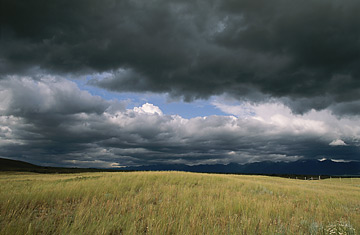
National Bison Range, Montana
You might not expect Montana to be a climate change pioneer. Though Montanans emit nearly twice as much greenhouse gases as the average American on a per-capita basis — thanks to the state's long distances and cold weather — the Treasure State accounts for just 0.6% of total greenhouse gas emissions in the U.S. But under Gov. Brian Schweitzer, this often right-leaning state is tackling both the effects of global warming and its causes, in a way that puts the federal government to shame. In November, a climate change advisory committee for the state, initiated by Schweitzer, delivered its first report, issuing 54 recommendations that would reduce Montana's greenhouse gas emissions to 1990 levels by 2020, including renewable energy incentives and reforestation. The Western state is also investing in biofuels and wind power, looking to wean itself off of the coal plants that produce most of its electricity. "We recognize that there is climate change happening," says Schweitzer, who was the first governor in the U.S. to sign the 25 x '25 initiative, which aims to have 25% of the country's energy produced from renewable sources by 2025. "We know that moving now will mitigate those effects."
That message — that global warming is urgent, and that action needs to be taken yesterday — hasn't resonated much in Washington yet, where the Bush Administration has dragged its feet on climate change and the Democratic-controlled Congress has often been paralyzed. But state governments are leading the way, especially in the West, where governors on both sides of the political divide — like Schweitzer, a Democrat, and Republican Arnold Schwarzenegger — have taken command on global warming, in the absence of Washington. Both governors are part of a coalition of five Western states aiming to create a regional carbon cap-and-trade system — exactly the kind of program that should be in place nationwide. "I believe this is the greatest imperative of our generation," says Schweitzer. "And in Montana, it might be greater than that."
Western states have jumped ahead on climate change in part because the effects of global warming seem more obvious out in the country. City dwellers can insulate themselves from changing weather patterns, but Montanans, who live much of their lives outdoors, feel when the climate is changing. "No matter what their education level, they know the winters are getting warmer," says Schweitzer. "Our forests are dying — in the summer they burn. People see this."
Rural states like Montana — where there is significant capacity for both wind power and biofuels — also stand to benefit from the transition to clean power. Montana can't produce a lot of the corn that currently goes to make most biofuel in the U.S., but it does have vast acreage that could be used to raise waste crops for cellulosic ethanol in the future, or biodiesel today. Schweitzer points out that his administration was able to pass a renewable energy portfolio standard, mandating that 15% of the state's power come from alternative sources by 2015. That's exactly the sort of standard — intended to speed the development of renewable power — that Congress wasn't able to keep in the new energy bill, passed last month. (The renewable portfolio was stripped out of the bill at the behest of the Bush Administration.) Montana has the largest coal reserves in the state, but Schweitzer still believes that alternatives are the only long-term solution. "People believe that wind power is for hippies living on the mountaintop, smoking marijuana, and real power only comes from hydrocarbons," he says. "But this standard has already spurred $1 billion in investment in renewables in Montana. Green is good for business."
It's not unusual for environmental initiatives to begin at the state level, filtering up to Washington, and that may be the case with climate change legislation as well. State governors, Schweitzer points out, are executives who need to respond to the demands of their voters if they want to stay in office — and climate change is on the public's mind. Congress and the President, on the other hand, are more insulated. But that needs to change. As heartening as the various state initiatives have been — more than half the states in the U.S. now have climate change legislation of some kind — it's time for Washington to step in, and do what only the federal government can do. "At branding time, if a calf doesn't volunteer to come over to the fire, you got to drag him over," says Schweitzer. "We might have to do that with Congress."
